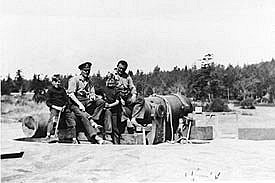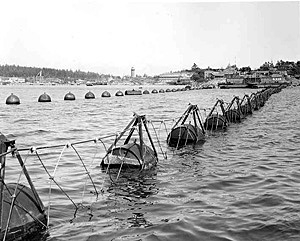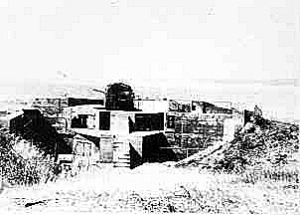In these days of drones and space age defence technology, it’s interesting to look back to a time when cannons, guns and local militia groups were the first line of defence.
The first coast artillery batteries to protect Victoria and Esquimalt harbours were positioned in 1878, when a crisis in the Balkans made war appear imminent. These coast defences stayed in existence for nearly 80 years, and helped ensure the security of the city of Victoria.
Strategic to this defence effort were the guns at Ford Rodd Hill (now Fort Rodd Hill/Fisgard Lighthouse National Historic Sites) across the water from Esquimalt harbour.
By guarding the naval base at Esquimalt, Ford Rodd’s batteries, finally declared obsolete in 1956, provided the warships of the Royal Navy and later of the Royal Canadian Navy with a secure anchorage from which they could sail to protect the entire coast of British Columbia.

Sgt. Percy (Titch) Buxton with two of his sons and Bombadier Bill Wharton sitting on one of the 6 inch disappearing guns in the Lower Battery, Fort Rodd Hill, about c. 1925.
In 1912, concerns over lack of a defence force on the coast and the Victoria area led to creation of a Militia Infantry Regiment to augment the existing Militia Artillery Regiment, the 5th Regiment, Canadian Garrison Artillery. The 88th Regiment (Victoria Fusiliers) were officially authorized and established as a Canadian Militia Regiment on September 3, 1912. As tensions in Europe increased in 1913 and 1914, the 88th Regiment increased in size and training commitments.

Anti-submarine net across entrance to Esquimalt Harbour, circa WWII. Photo Catalogue No. VR992.207.25.
Just as wars and rumours of war prompted the positioning of coastal batteries in the 1870s, unease about Germany’s war-like intentions in 1914 prompted BC’s Premier Sir Richard McBride to make a bold political move, the purchase of two submarines originally built for Chile, Iquique and Antofogasta (later named CC1 and CC2), for protection of Canada’s West Coast.
James Peters was also ready for the defence of Canada`s West Coast when he arrived in Victoria at 11 pm on November 10, 1887 on the steamer Princess Louise. Despite the late hour, a large crowd was on hand at the wharf to give a rousing welcome to “C” Battery, which was under his command.
During the Second World War, similar uncertainties about Japan’s hostile intentions resulted in the formation of BC’s own Home Guard, the Pacific Coast Militia Rangers (PCMR).

